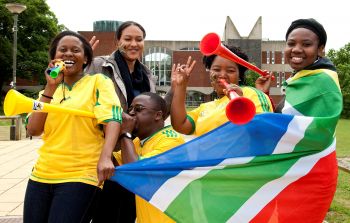Ke Nako! African students celebrate World Cup
By: James Hakner
Last updated: Friday, 11 June 2010

Students from across the African continent gathered on campus today to watch World Cup hosts South Africa kick off in the opening match of the first global football tournament to take place in Africa.
The University of Sussex and Institute of Development Studies students are all postgraduates, studying global economics, development and governance.
But today studies were put aside in favour of flag-painted faces, vuvuzela horns and cries of "Ke Nako!" (meaning "It's time!" in Sotho) when the students met in Library Square to celebrate Africa's place in the tournament. They then joined fans of opposing side Mexico to watch the game in the Institute of Development Studies on campus.
Kelvin Hazangwi, from Zimbabwe, is studying for an MA in Gender and Development. He says: "We are all South Africans today, but we will support all the African teams through the tournament. I am sad I can't be there today, but we have got together on campus to create the South African atmosphere away from home."
Tshegofatso Motaung, is a South African studying for an MA in Global Political Economy. She says: "It's mind-blowing, to see how far South Africa has come. The World Cup concert in Soweto last night was really blasting. I am so proud of the way our people are able to be happy in spite of everything."
Sussex has a history of close ties with South Africa. Former President Thabo Mbeki was a student at Sussex in the 1960s, as were other members of post-apartheid governments in South Africa.
The Mandela Scholarship Fund was set up in 1973 at the University via the efforts of students and staff. Its purpose was to provide higher education to South African students who were unable to study at university level because of discriminatory apartheid laws.
Today it continues this tradition by offering two or three postgraduate scholarships per year to South African and Namibian students from communities who were disadvantaged by the apartheid era. It is intended that the scholars will gain knowledge and skills that they can use constructively on their return home.
The trust is supported by donations from University staff and students, grants from charities, and by fund-raising activities on campus. The University contributes by waiving the scholars' fees.
Mandela Hall, in Falmer House, was named after the legendary leader of the struggle against apartheid, and the country's first black President - Nelson Mandela.

